Compound Feed Market by Ingredients (Cereals, Cakes & Meals, By-Products, and Supplements), Form (Mash, Pellets, Crumbles), Livestock (Ruminants, Poultry, Swine, and Aquaculture), Source (Plant-Based and Animal-Based), and Region - Global Forecast to 2028
The global market for compound feed was valued at USD 541.2 billion in 2023 and is projected to reach USD 668.3 billion by 2028, at a CAGR of 4.3% during the forecast period.
The increasing consumer concern for animal health and welfare throughout the food production chain has created a strong demand for products that prioritize humane and healthy practices. Consumers are actively seeking assurances that animals used in meat, dairy, and egg production are raised in a responsible manner. This shift in consumer preferences presents an opportunity for compound feed manufacturers to capitalize on by developing and promoting feed formulations that contribute to the overall well-being of animals. One of the key considerations in addressing animal health and welfare is recognizing that different animal species have unique nutritional requirements. Manufacturers can take advantage of this focus on animal welfare by developing specialized compound feed formulations tailored to meet the specific needs of different species. This process may involve adjusting the nutrient composition to support optimal growth and development, incorporating functional additives that promote health and disease prevention, and exploring alternative protein sources that align with specific dietary needs. By offering customized compound feed solutions, manufacturers can address the specific health and welfare concerns of various animal species, catering to the diverse needs of farmers and livestock producers.
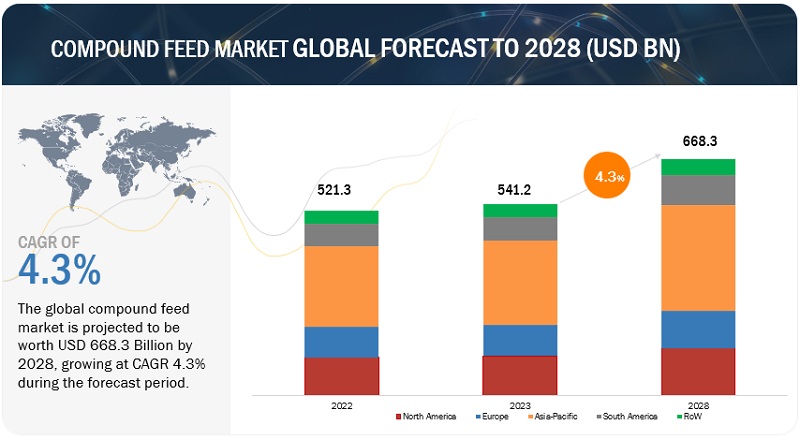
To know about the assumptions considered for the study, Request for Free Sample Report
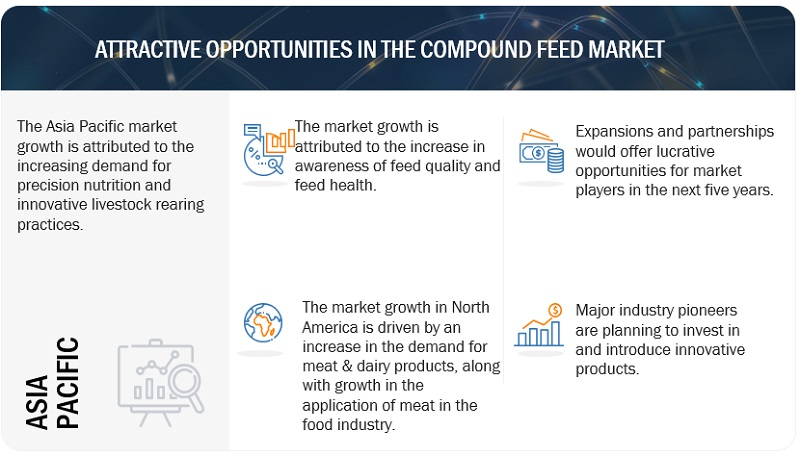
To know about the assumptions considered for the study, download the pdf brochure
Drivers: Surge in demand for appropriate livestock nutrition
Livestock continues to make an important contribution to the global food chain. It is seen that energy fluctuation and imbalance in the metabolic process can induce various diseases and hamper livestock performance. The major reasons include inappropriate nutrition, overeating, and lack of physical activity. Compound feed is a careful mix of ingredients that provide a proper blend of carbohydrates from cereals, fat and protein from oilseeds, and fiber, which is highly valuable in animal nutrition. Feeding good-quality feed to animals, which includes grains like corn and barley, changes the color of carcass fat from yellow to white, which increases the chance of obtaining higher-quality meat for commercial purposes. Additionally, the use of compound feed helps in obtaining high-quality milk, eggs, and dairy products and further helps in a good feed conversion ratio.
Livestock breeders often look for compound feed as a convenient and efficient way to provide a balanced diet to their animals. Compound feed, also known as complete feed or mixed feed, is a mixture of various ingredients that are formulated to meet the nutritional requirements of specific types of livestock. Compound feed is produced through standardized processes, ensuring consistent quality and nutritional composition. This consistency is crucial for maintaining the health and productivity of livestock. It eliminates the variations that can occur when using multiple feed ingredients from different sources. And also, Compound feed production involves economies of scale, making it a cost-effective option for livestock breeders. Purchasing ingredients in bulk and using specialized equipment for formulation and production can help reduce costs compared to buying individual ingredients separately.
Restraints: Volatile raw material prices for manufacturing of compound feed
The prices of raw materials like seeds and plant leaves have been experiencing fluctuations, while the extraction methods have become more costly for producers. Interestingly, the main raw material itself has become cheaper. On the other hand, the prices of cereals such as corn, barley, and oats have been steadily increasing. This upward trend can be attributed to the impact of the COVID-19 pandemic, which has caused a sudden surge in prices. The availability of feed has become a critical issue for the industry, particularly due to the growing global population and the resulting increased demand for food. As a result, the industry is facing significant challenges in procuring essential raw feed like corn, wheat, and barley. The ongoing Ukraine-Russia war has further exacerbated this problem, leading to disruptions in the supply chain and contributing to the volatility of raw material prices. Consequently, the production of compound feed for livestock is expected to be adversely affected by this situation.
Opportunities: Growing importance of livestock feeding practice in developing economies
Intensive livestock production is booming in emerging countries; however, there are still vast areas where extensive livestock production, especially ruminants, is largely supported by grazed pastures. The only approach to minimize grassland degradation while maintaining the health of the animal is by reducing animal density. The low productivity of ruminants in developing countries is reflected by high mortality, the poor growth rate of young ones, delay in the onset of puberty, and long intervals between successive parturition, all of which are largely attributed to poor feed resources, feeding, and management. However, high mortality and inadequate milk production by nursing mothers affect the growth rate of those who survive. Therefore, economics strategists and government policies encourage livestock farmers to transform the extensive system of production into semi-intensive systems with additional imported feed inputs. The low productivity in ruminants in developing countries is reflected by high mortality, the poor growth rate of young ones, delay in the onset of puberty, and long intervals between successive parturition, all of which are largely attributed to poor feed resources, feeding, and management. Therefore, it is important to improve the productivity of ruminant livestock through the promotion of early weaning of young ones. Compound feed provides a mix of optimum nutrition to livestock, and it is available in different forms and can be fed to different livestock from an early age. To increase productivity and performance, many farmers are adopting nutrition specifically designed for livestock, which will impact the demand for compound feed in developing nations.
Challenges: Stringent regulatory framework
Animal health is a vital component in the food chain, and the prevention and management of infectious diseases like zoonotic disease are also essential. In 2011, the US FDA and the Association of American Feed Control Officials partnered to develop the Animal Feed Regulatory Program Standards. The feed standards establish a uniform foundation for the design and management of states' programs responsible for the regulation of feed. In the European Union, there are standards for feed materials, compound feed, and others like feed additives. The Commission and the EU countries discuss animal nutrition issues in the Standing Committee on Plants, Animals, Food, and Animal Nutrition. Manufacturers must abide by the regulations and provide proper details of the ingredients used in the manufacturing of compound feed. Manufacturers need to fulfill the requirement regarding the health and safety of the product they manufacture for livestock and its adverse effect on the environment. They are also required to submit the documents for approval from the respective regulatory body, and altogether, it adds up to the overall production cost. These factors contribute to the challenges faced by compound feed manufacturers.
Compound Feed Market: Value Chain Analysis
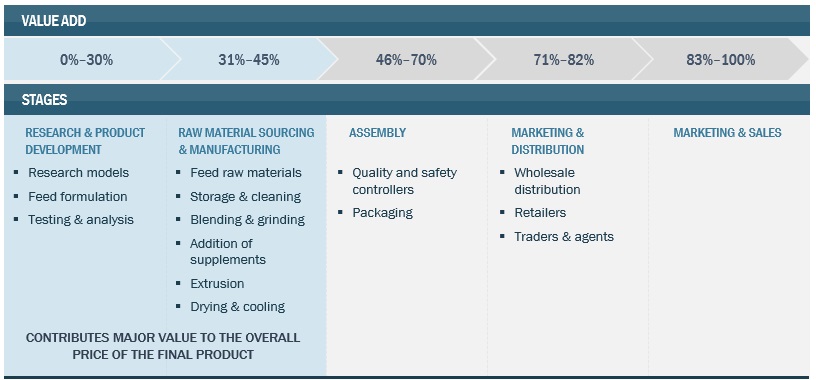
Based on ingredients, cereals are estimated to account for the largest market share of the compound feed market.
Cereal crops, such as corn and wheat, have several characteristics that contribute to their dominance in the compound feed market. They are abundantly grown and easily accessible in many regions, resulting in large quantities being available for use in compound feed formulations. This abundance makes cereals a cost-effective option for feed manufacturers. Additionally, cereals offer versatility in formulating compound feeds for different animal species. They can be processed and combined with other feed ingredients to meet specific nutritional requirements. Whether used as the main ingredient or as part of a blend, cereals provide a flexible base for creating feeds suitable for various animals. Taking into account their abundance, accessibility, versatility, and feed conversion efficiency, cereals possess key attributes that contribute to their dominance in the compound feed market.
Based on livestock, poultry-related compound feed is anticipated to dominate the market.
Poultry, especially chicken, is one of the most widely consumed meats globally. The demand for poultry products, such as meat and eggs, is consistently high due to factors like affordability, versatility, and nutritional value. Nutritional value is a significant driver of the demand for poultry products. The nutritional value of poultry meat, such as chicken, is a major factor driving the demand for these products. Poultry is recognized for being a rich source of high-quality protein, essential amino acids, vitamins, and minerals. With lower fat content compared to red meats, particularly when consumed without the skin, poultry products are often perceived as healthier options. Consumers who prioritize nutritious and balanced diets consider poultry as an important component, leading to the sustained demand for poultry products. Additionally, the global acceptance of poultry products plays a significant role in their high demand. Poultry, especially chicken, has become a staple in many cuisines and dietary traditions worldwide. Its versatility and adaptability to various cooking styles have led to its integration into diverse cultural dishes. This global acceptance of poultry products across different regions and cultures bolsters their consistent demand.
Based on form, the mash form of compound feed is projected to witness the largest market share during the forecast period.
Mash feed offers the advantage of providing a consistent distribution of ingredients throughout the mixture, which helps prevent selective feeding by animals. By eliminating the ability to pick and choose specific ingredients, mash feed ensures that animals receive a balanced diet with all the necessary nutrients. Additionally, the production of mash feed is cost-effective as it requires less equipment and processing compared to more complex forms like pelleted or extruded feed. This streamlined production process can lead to cost savings for feed manufacturers, which can potentially be passed on to customers, making mash feed an economical choice in the compound feed market.
The Asia Pacific market is projected to contribute the largest share in the compound feed market.
The livestock and poultry industry in the Asia Pacific region has witnessed significant growth, driven by multiple factors. As incomes rise and dietary preferences change, there is an increased consumption of animal protein, leading to a surge in demand for livestock and poultry products. To meet this demand, there has been an expansion of livestock and poultry production, which in turn creates a substantial need for compound feed. Furthermore, the rapid urbanization occurring across many countries in the region has contributed to the expansion of the livestock industry. As people migrate to urban areas, there is a notable shift in dietary patterns, with an inclination towards higher meat and dairy consumption. This urbanization trend has further fueled the demand for compound feed, as intensive animal production systems require adequate nutrition for optimal productivity.
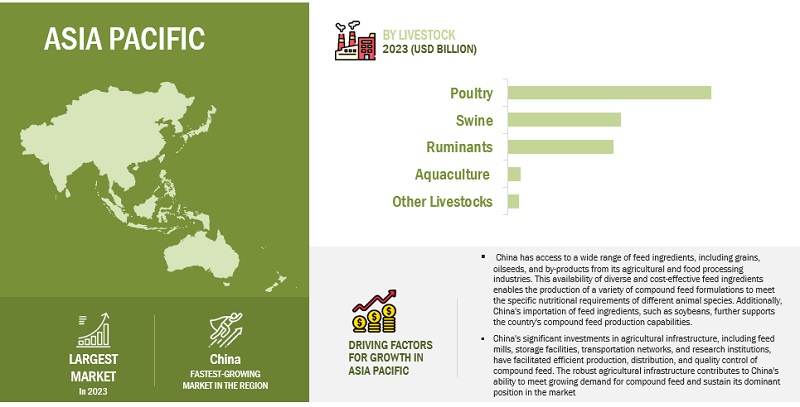
Key Market Players
Cargill, Inc. (US), ADM (US), Charoen Pokphand Foods (Thailand), New Hope Group (China), and Land O’Lakes (US) are among the key players in the global compound feed market. To increase their company's revenues and market shares, companies are focusing on launching new products, developing partnerships, and expanding their production facilities. The key strategies used by companies in the compound feed market include geographical expansion to tap the potential of emerging economies, strategic acquisitions to gain a foothold over the extensive supply chain, and new product launches as a result of extensive research and development (R&D) initiatives.
Get online access to the report on the World's First Market Intelligence Cloud
- Easy to Download Historical Data & Forecast Numbers
- Company Analysis Dashboard for high growth potential opportunities
- Research Analyst Access for customization & queries
- Competitor Analysis with Interactive dashboard
- Latest News, Updates & Trend analysis
Request Sample Scope of the Report
Get online access to the report on the World's First Market Intelligence Cloud
- Easy to Download Historical Data & Forecast Numbers
- Company Analysis Dashboard for high growth potential opportunities
- Research Analyst Access for customization & queries
- Competitor Analysis with Interactive dashboard
- Latest News, Updates & Trend analysis
|
Report Metric |
Details |
|
Market size estimation |
2023–2028 |
|
Base year considered |
2022 |
|
Forecast period considered |
2023–2028 |
|
Units considered |
Value (USD), Volume (MMT) |
|
Segments Covered |
By Ingredient, By Form, By Livestock, By Source, and By Region |
|
Regions covered |
North America, Europe, Asia Pacific, South America, and RoW |
|
Companies studied |
|
Compound Feed Market:
By Ingredient
- Cereals
- Cakes & Meals
- By-Products
- Supplements
By Livestock
- Ruminants
- Poultry
- Swine
- Aquaculture
- Other livestock
By Form
- Mash
- Pellets
- Crumbles
- Other forms
By Source
- Plant-Based
- Animal-Based
By Region:
- North America
- Europe
- Asia Pacific
- South America
- Rest of the World (RoW)*
*RoW includes the Middle East and Africa.
Recent Developments
- In April 2022, Cargill and Intelia entered into a strategic partnership to enhance broiler performance through a new precision management tool. The data from this digital platform would help maximize bird health and well-being, operational performance, and efficiency.
- In May 2022, ADM acquired a feed mill in the Philippines, which will support the company’s growth in the region through a wide range of products like pet food, complete feed, aquaculture, and premix solutions. Additionally, the acquisition will strengthen the company’s portfolio.
- In June 2021, Charoen Pokphand Foods (Thailand) acquired C.P. Aquaculture (India), a food and beverage manufacturer, to increase its shareholding to 75%. CPA is involved in the manufacturing and distribution of shrimp feed. This acquisition will help Charoen Pokphand Foods to expand its shrimp feed business.
Frequently Asked Questions (FAQ):
Which region is projected to account for the largest share in the compound feed market?
The Asia Pacific region accounted for the largest share, in terms of value, of USD 227.2 billion, of the global compound feed market in 2022 and is expected to grow at a CAGR of 4.7% during the forecast period. The growing population and rising demand for meat & livestock products are expected to drive the growth of the compound feed market in emerging counties such as China, India, and Thailand, to name a few.
What is the current size of the global compound feed market?
The global market for compound feed was valued at USD 541.2 Billion in 2023 and is projected to reach USD 668.3 Billion by 2028, at a CAGR of 4.3% during the forecast period.
Which are the key players in the market?
The key players in this market include Cargill, Inc. (US), ADM (US), Charoen Pokphand Foods (Thailand), New Hope Group (China), Land O’Lakes (US), Nutreco N.V. (Netherlands), Alltech, Inc. (US), Guangdong Haid Group Co., Ltd (China), Weston Milling Group (Australia), and Feed One Co. (Japan).
What are the factors driving the compound feed market?
- Increasing demand for meat, dairy, and eggs drives the need for compound feed.
- Growing population and changing dietary preferences fuel the rise in livestock production.
- Industrialization of animal farming necessitates efficient and cost-effective feeding solutions.
- Focus on animal health and nutrition enhancing the demand for specialized feed products.
What are the chellenges of the compound feed market?
- Raw material availability and price volatility.
- Regulatory compliance and standards.
- Disease outbreaks and biosecurity risks.
To speak to our analyst for a discussion on the above findings, click Speak to Analyst
This research study involved the extensive use of secondary sources directories and databases such as Bloomberg Businessweek and Factiva—to identify and collect information useful for a technical, market-oriented, and commercial study of the compound feed market. In-depth interviews were conducted with various primary respondents—such as key industry participants, subject matter experts (SMEs), C-level executives of key market players, and industry consultants—to obtain and verify critical qualitative and quantitative information as well as to assess prospects.
Secondary Research
In the secondary research process, various sources, such as the Food and Agriculture Organization (FAO), United States Department of Agriculture (USDA), European Food Safety Authority (EFSA), European Association of Specialty Feed Ingredients and their Mixtures (FEFANA), International Feed Industry Federation (IFIF), Animal Feed Manufacturers Association (AFMA), National Grain and Feed Association (NGFA), The Compound Feed Manufacturers Association (CLFMA), Alltech Feed Survey, and academic references pertaining to compound feed were referred to identify and collect information for this study. The secondary sources also include livestock feed journals, press releases, investor presentations of companies, white papers, certified publications, articles by recognized authors and regulatory bodies, trade directories, and paid databases.
Secondary research was mainly conducted to obtain critical information about the industry’s supply chain, the total pool of key players, and market classification & segmentation, according to the industry trends to the bottom-most level and geographical markets. It was also used to obtain information about the key developments from a market-oriented perspective.
Primary Research
The market comprises several stakeholders in the supply chain, which include feed manufacturers, dairy, poultry growers, and other livestock growers, feed importers and exporters, and intermediary suppliers such as traders and distributors of compound feed. Various primary sources from both the supply and demand sides of the market were interviewed to obtain qualitative and quantitative information. The primary interviewees from the supply side include compound feed manufacturers. The primary sources from the demand side include distributors, importers, exporters, and end-use sectors.
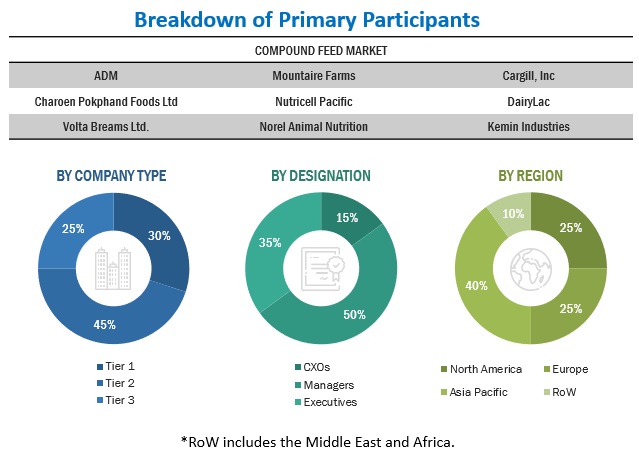
To know about the assumptions considered for the study, download the pdf brochure
Market Size Estimation
The following approaches represent the overall market size estimation process employed for the purpose of this study.
Both top-down and bottom-up approaches were used to estimate and validate the total size of the market. These approaches were also used extensively to estimate the size of various dependent submarkets. The research methodology used to estimate the market size includes the following:
Top-down Approach:
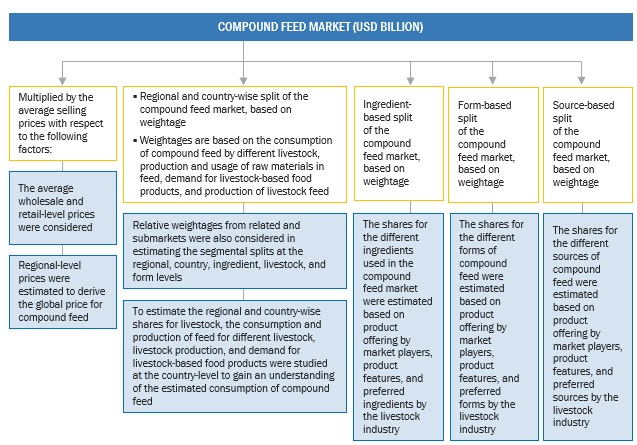
To know about the assumptions considered for the study, Request for Free Sample Report
Bottom-up Approach:
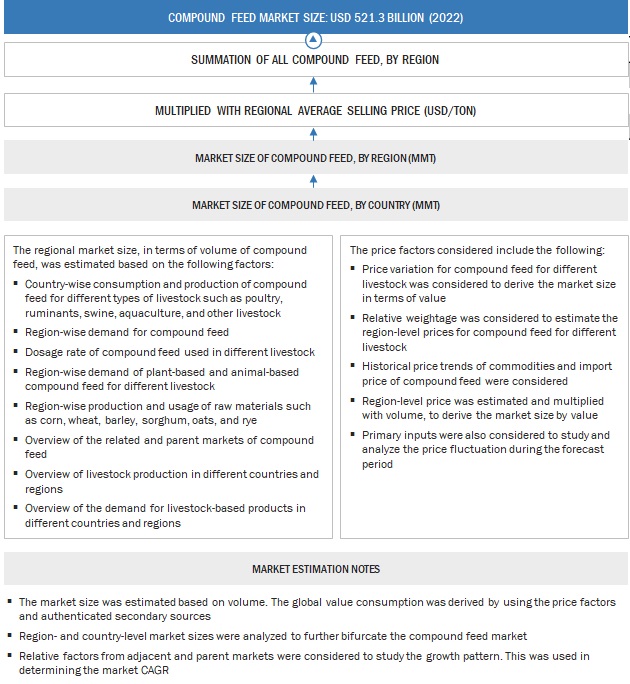
The following sections (bottom-up & top-down) (supply-demand) depict the overall market size estimation process employed for this study.
Data Triangulation
After arriving at the overall market size from the estimation process explained above, the total market was split into several segments and subsegments. The data triangulation and market breakdown procedures were employed, wherever applicable, to estimate the overall compound feed market and arrive at the exact statistics for all segments and subsegments. The data was triangulated by studying various factors and trends from the demand and supply sides. Along with this, the market size was validated using the top-down and bottom-up approaches.
Market Definition
According to the Food and Agriculture Organization (FAO), compound feed is defined as “A mixture of products of vegetable or animal origin in their natural state, fresh or preserved, or products derived from the industrial processing thereof, or organic or inorganic substances, whether or not containing additives, for oral feeding in the form of a complete feed
The compound feed market refers to the industry involved in the manufacturing of formulated feed products for animals. Compound feed, also known as complete feed or mixed feed, is a nutritionally balanced combination of various ingredients such as cereals, cakes & meals, by-products, and supplements. The feeds can be processed into different forms, including mash, pellets, and crumbles, to suit the specific needs and preferences of the animals. The market serves ruminants, poultry, swine, and aquaculture species. It also takes into account the source of the ingredients, which can be plant-based or animal-based and is influenced by regional factors.
Stakeholders
- Feed and feed ingredient manufacturers and feed integrators
- Traders & distributors
- Livestock farmer associations and large animal husbandry companies
- Agricultural research organization
- Associations, regulatory bodies, and other industry-related bodies:
Food and Agriculture Organization (FAO)
- EU Association of Specialty Feed Ingredients and their Mixtures (FEFANA)
- International Feed Industry Federation (IFIF)
- European Feed Manufacturers Federation (FEFAC)
- The Association of American Feed Control Officials (AAFCO)
- American Feed Industry Association (AFIA)
Report Objectives
Market Intelligence
- Determining and projecting the size of the compound feed market with respect to ingredient, livestock, form, source, and regional markets
- Identifying the attractive opportunities in the market by determining the largest and fastest-growing segments across regions
- Providing detailed information about the key factors influencing the market growth (drivers, restraints, opportunities, and industry-specific challenges)
- Providing the regulatory framework for major countries related to the compound feed market
- Analyzing the micro-markets with respect to individual growth trends, prospects, and their contribution to the total market
Competitive Intelligence
- Identifying and profiling the key players in the compound feed market
-
Providing a comparative analysis of market leaders based on the following:
- Product offerings
- Business strategies
- Strengths and weaknesses
- Key financials
- Understanding the competitive landscape and identifying the major growth strategies adopted by players across the key regions
- Analyzing the value chain and products across the key regions and their impact on the prominent market players
- Providing insights on key product innovations and investments in the global compound feed market
Available Customizations:
With the given market data, MarketsandMarkets offers customizations according to company-specific scientific needs.
The following customization options are available for the report:
Product Analysis
- Product Matrix, which gives a detailed comparison of the product portfolio of each company
Geographic Analysis
With the given market data, MarketsandMarkets offers customizations according to company-specific scientific needs.
- Further breakdown of the Rest of Europe market for Compound feed into Poland, Netherlands, Denmark, Belgium, and other EU and non-EU countries.
- Further breakdown of the Rest of the South America market for Compound feed into Colombia, Peru, Paraguay, Chile, and Venezuela
- Further breakdown of the Rest of Asia Pacific for Compound feed into Malaysia, Singapore, Philippines, Vietnam, South Korea, and other ASEAN countries.
Company Information
- Detailed analyses and profiling of additional market players (up to five)




 Generating Response ...
Generating Response ...







Growth opportunities and latent adjacency in Compound Feed Market